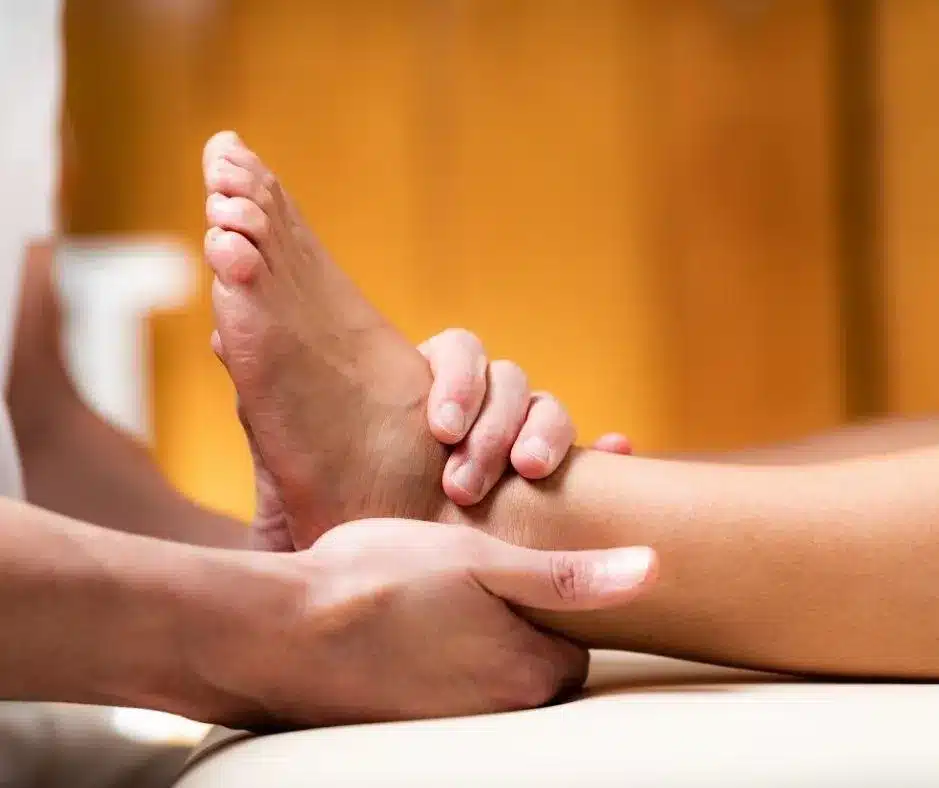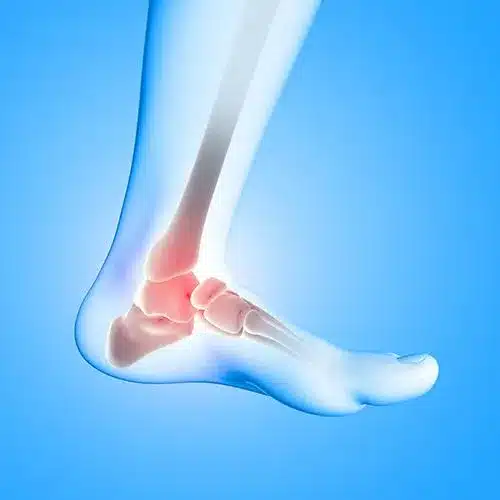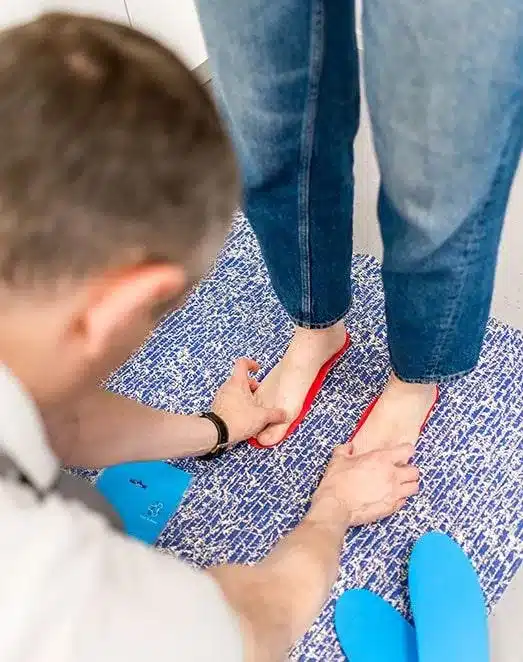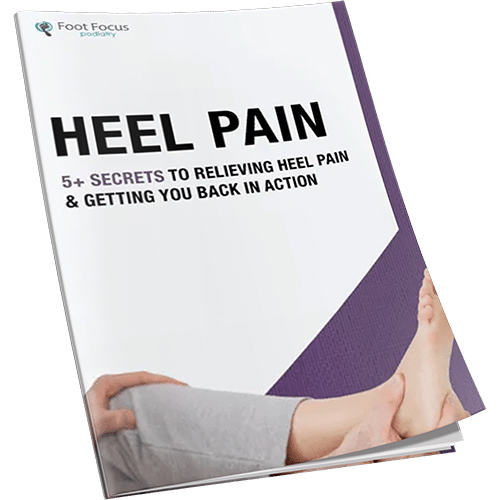Are You Looking For A Solution To Your Heel Pain In Finglas & Mount Merrion ?
Heel pain is the #1 reason patients reach out to us at Foot Focus Podiatry Clinic.
Our patients get in touch when heel pain is preventing them from doing things they once took for granted, like going for a walk whenever they want. We get it, and we’re here to offer support and effective treatment options.
Does any of this sound like YOU?
- Do you experience pain in your heel when you get up in the morning or after sitting for a while?
- Have you visited many clinics, but you're still in pain?
- Have you spent a lot of money on orthotics or insoles that didn't fix your problem?
- Do you avoid going for a walk because you know your heel pain will be too intense?
- Have you been told that a painful injection is the next step?
- Are you starting to worry that you will never get rid of this heel pain and might never be able to do the things you love again?
If you answered YES to any of the above, you may have found the answer to your heel pain at Foot Focus Podiatry Clinic, Finglas & Mount Merrion
What Causes Heel Pain?... And why is your foot pain not getting better?
Heel pain can have many causes, including the most common conditions like plantar fasciitis and achilles injuries. But no matter what the cause, our team of heel pain experts is dedicated to helping you get the answers you need.
We know that you want to understand what’s causing your pain, why it’s happening, and most importantly, how to get rid of it. That’s why we take a personalised approach to each patient and work with you to develop a treatment plan that fits your unique needs.
What Is Our Approach To Fixing/Treating Heel Pain

- Step 1: Hands-On Treatment
Following a comprehensive assessment of your heel pain which included static and dynamic tests, our knowledgeable and experienced therapists will construct a treatment plan tailored to your specific circumstances, injury and goals.
Our committed team use a very much hands-on treatment approach to get you out of pain and back on the road to recovery.
This is likely to include foot mobilisation, which works to optimise the movement of the bones and joints for the foot to function more correctly, thereby relieving the strain on the muscles, tendons and ligaments.

- Step 2: Tailored Rehab Programme
Each treatment aims to gently and progressively get your foot and ankle moving again without pain as quickly as possible. Our heel programme involves:
- Padding & Strapping (for pain relief)
- Stretches
- Personalised Strengthening Exercises
- Laser Therapy
- Footwear review
This allows you to get back to normal and start doing the things you love, free from the debilitating pain you have been experiencing.

- Step 3 - Recovery
If appropriate, we may prescribe custom orthotics to help redirect pressure within your foot which may be contributing to your heel pain.
Orthotics can help to address any underlying issues predisposing you to this type of injury and help prevent any reoccurrence in the future.
Our custom orthotics are made using the latest 3D foot scanner making them highly accurate. All our orthotics come with a comfort guarantee.
Download Our Free Report
Is foot pain stopping you from living life to its fullest? Don’t let it sideline the hobbies and activities you love most. Our free foot pain report uncovers the key causes of pain and provides expert tips to relieve discomfort, improve strength, and avoid future injuries. Take control of your recovery and get back on your feet by taking the first step on your health and wellness journey.
Is The Heel Pain Programme Right for You?
- Our team of podiatrists at Foot Focus Podiatry Clinic are experts in heel pain treatment, helping 1000's of patients get back to walking and running with relief from heel pain.
Here’s just a few of the things our Podiatry Team can do for you:
- We can quickly take away the pain and stiffness – often inside a couple of sessions
- We can tell you “what you have, why you have it and how to get rid of it”.
- We can help you find out what’s really going on, and get to the root cause of your heel pain once and for all – often inside 20 minutes
- We can help you enjoy living with more energy each day
- We can help you put an end to taking painkillers that are no good for your health long-term
- We can help you avoid surgery – and painful injections
- We can help you keep out of the Doctor’s waiting room or from making repeat visits only to be given more pills!
- We can help you get back to enjoying quality time with family and friends that heel pain has stolen from you
- We can help you keep active and live a full life free from the curse of heel pain.
Your First Podiatry Visit: A Step-by-Step Guide
- Discuss your foot health goals
- Complete foot examination
- Discover your options
- Start a custom treatment plan

6 Reasons To Choose Foot Focus Podiatry Clinic
- Highly qualified and experienced podiatrists: The team at Foot Focus Podiatry Clinic in Dublin has a team of podiatrists with exceptional qualifications and experience. Every practitioner is adept at diagnosing and managing a wide array of foot and ankle conditions. With their wealth of expertise, you can trust in the delivery of exceptional care.
- Extensive Expertise in Foot Health: Foot Focus Podiatry Clinic in Dublin takes pride in its highly qualified and well-experienced team of podiatrists. These experts are trained to diagnose and treat a wide range of foot and ankle conditions, ensuring that your care is in the best possible hands.
- State-of-the-Art Equipment for Optimal Care: We've equipped our clinic with the most advanced podiatric technology and equipment available. This investment ensures that you receive diagnoses with the highest level of accuracy and recommended treatments that are remarkably effective, all geared towards expediting healing and reducing pain.
- Convenient Location: Situated in the heart of Dublin, the clinics offers easy accessibility for both city residents and those from the surrounding areas. This central location makes it simple for patients to schedule and attend appointments without hassle.
- Focus on Education: Foot Focus Podiatry Clinic believes in educating patients about their conditions and treatment options. You'll receive clear explanations about your diagnosis and treatment plan, empowering you to take an active role in your foot health. Additionally, they provide preventative advice to help you maintain healthy feet in the long term.
- Happy Patients, Positive Reviews: The resounding success of Foot Focus Podiatry Clinic is vividly portrayed through our happy patients' positive feedback and testimonials. Their experiences highlight our clinic's unrelenting pursuit of excellence and dedication to ensuring every patient leaves satisfied and content.
Heel pain can be caused by various factors, including plantar fasciitis, Achilles tendinitis, heel spurs, stress fractures, bursitis, and nerve entrapment. It can also result from wearing improper footwear, overuse or excessive strain on the feet, and certain medical conditions such as arthritis or obesity.
Plantar fasciitis is a common cause of heel pain. It occurs when the plantar fascia, a band of tissue that runs along the bottom of the foot, becomes inflamed or irritated. This often leads to sharp or stabbing pain in the heel, especially with the first steps in the morning.
Diagnosis of heel pain involves a thorough examination by a healthcare professional. They will assess your symptoms, medical history, and perform physical tests. In some cases, imaging tests such as X-rays or ultrasound may be required to rule out underlying conditions.
Treatment for heel pain depends on the underlying cause. It may include rest, ice therapy, wearing supportive and properly fitted shoes, using orthotic inserts or heel cups, performing stretching and strengthening exercises, taking pain relievers, and undergoing physical therapy. In severe cases, medical interventions like corticosteroid injections or surgery may be recommended.
The duration of heel pain recovery varies depending on the cause and individual factors. With appropriate treatment and self-care measures, many people experience relief within a few weeks to several months. However, some conditions may require longer periods for complete resolution.
It’s important to avoid high-impact activities or exercises that worsen your heel pain. However, low-impact exercises such as swimming, cycling, or gentle stretching can often be beneficial. Consult with a healthcare professional for specific recommendations tailored to your condition.
Yes, there are several home remedies that can provide relief for heel pain. These include applying ice packs to the affected area, performing gentle stretches and massages, using over-the-counter pain-relieving creams or gels, and resting the feet whenever possible.
Yes, wearing improper footwear can contribute to heel pain. Shoes that lack proper arch support, cushioning, or stability can strain the feet and lead to various conditions that cause heel pain. It’s important to wear supportive shoes that fit well and provide adequate protection and comfort.
It is advisable to seek medical attention if your heel pain persists despite home remedies, becomes increasingly severe, affects your ability to walk or perform daily activities, or is accompanied by swelling, redness, or fever. A healthcare professional can provide a proper diagnosis and recommend appropriate treatment options.
While it’s not always possible to prevent all causes of heel pain, there are preventive measures that can help reduce the risk. These include wearing supportive shoes, maintaining a healthy weight, avoiding excessive strain on the feet, gradually increasing activity levels, and performing regular foot exercises and stretches.


